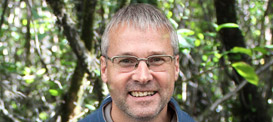Frank Mayle

Frank is a tropical palaeoecologist interested in the long-term dynamics and interactions between Neotropical ecosystems, climate change, and human land use over centennial to multi-millennial timescales. His lab specialises in the analysis of fossil pollen and charcoal from radiocarbon-dated lake and bog sediments to reconstruct past environmental change. His first coring expedition to South America was in 1995 in a remote, but spectacular, corner of Amazonian Bolivia – Noel Kempff Mercado National Park – which sparked his long-term interest in Quaternary forest-savanna dynamics. Since then, he has been fortunate enough to expand his fieldwork across Amazonian Bolivia – via close collaboration with botanists at the Noel Kempff Mercado Natural History Museum of Santa Cruz. Ongoing collaboration with archaeologists, palaeoenvironmental scientists, and modellers – at both UK and Brazilian institutions – has enabled him to expand his research across much of Brazil, encompassing both Amazonian and Atlantic Forest ecosystems. His research has been funded by NERC, AHRC, and The Leverhulme Trust in the UK, as well as FAPESP and CNPq in Brazil, and National Geographic in the US.
He has a BSc in Botany from the University of Reading (1986), an MSc in Palynology from the University of Sheffield (1988), and a PhD in Palaeoecology from the University of New Brunswick, Canada (1993). He held a postdoctoral position at Royal Holloway, University of London (1993-94) and took up his first academic post at the University of Leicester in 1994, before moving to the University of Edinburgh in 2004 and returning full circle to the University of Reading in 2013, where he is currently Professor in Tropical Paleoecology.
